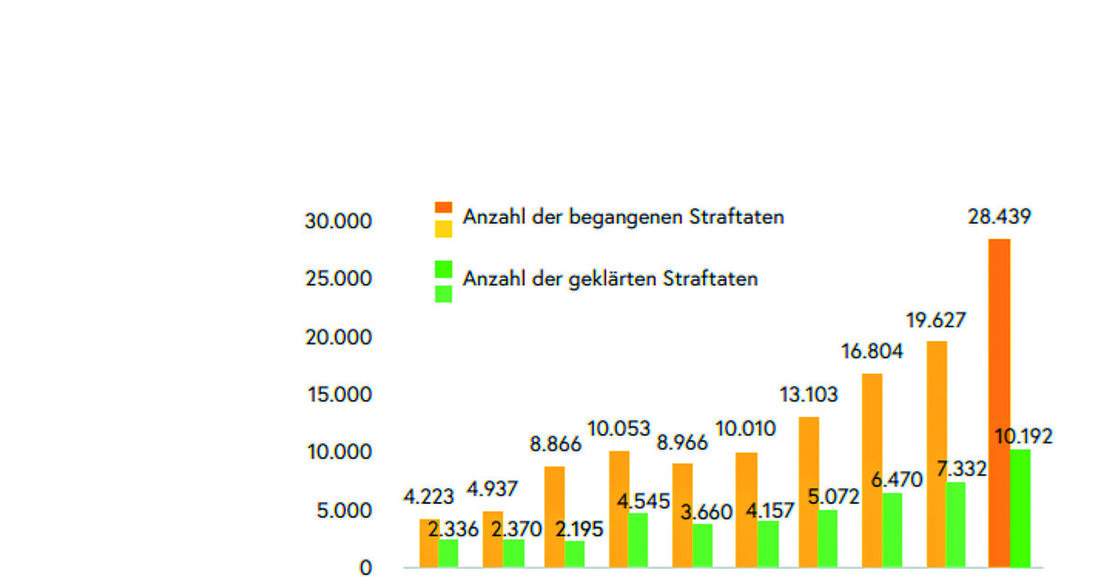Increased risk of viruses in the home office
Cybercrime is becoming an increasingly serious problem for companies. A new record could be imminent in 2020 due to the Corona measures. An expert explains what you should pay attention to.

Increased risk of viruses in the home office
“There are two types of large companies in the United States: those that have been hacked by the Chinese and those that don’t know they have been hacked by the Chinese.” With these words, former FBI chief James Comey wanted to illustrate the danger posed by digitalization. In fact, the risk of being hacked is greater than ever, worldwide, especially for smaller companies and of course not only by Chinese cybercriminals. This presents companies with enormous challenges.
Already in 2019, Austria recorded an increase in cybercrime of almost 45 percent (see graphic). The attacks that have become known are probably just the tip of the iceberg. Experts estimate that the number of unreported attacks on companies is far higher than the official crime statistics reflect. And a new record could be imminent in 2020 due to the Corona measures. The European police agency Europol warned in April: “With a record number of potential victims in the European Union staying at home and using online services due to the pandemic, the opportunities for cybercriminals to exploit vulnerabilities and new opportunities have multiplied.”
Internet and digitalization expert Sanjay Sauldie warns: “The systems are even more vulnerable when working from home.” Criminals would prefer to strike where the rewards are low, i.e. at companies where IT security is not up to date. Sauldie points out that the biggest weak point is not technology, but people. All too often, the industry expert complains, employees have access to business-critical information without knowing what responsibility they have. In a webinar organized by Motor Presse Klub Austria (MPKA) on the topic of “Security on the Internet”, Sauldie gave tips on how to protect yourself against cybercrime.
Alarm bells ring when it comes to EXE or ZIP files
This starts with basics such as good passwords, which should also be changed monthly, or the fact that dangerous phishing emails can often be recognized by grammatical or spelling errors, as attackers from abroad often use translation programs. The sender's email address is also often suspicious. However, hackers are becoming more and more professional and are sometimes replicating entire websites, such as those of banks. Here, a look at the inevitably suspicious URL is revealing. Fraudulent online shops can usually be recognized by the fact that the only possible payment method is a bank transfer. Alarm bells should also ring if you are directly asked to open EXE or ZIP files. If a notification via SMS or e-mail contains a link that you should click on with extreme urgency, the addressees can usually assume phishing. Reputable companies usually do not provide direct links to the login page.
The same applies to entering passwords directly in the email. According to Sauldie, regular backups on external hard drives or cloud solutions as well as protection programs from virus protection to a firewall to anti-spyware are mandatory. If necessary, an external expert should be brought in to evaluate security risks. “Even the car,” the expert warns in conclusion, “is no longer safe from cybercriminals.” Signals from electronic car keys can be intercepted even through a house wall, copied and used to start the engine. Car keys should therefore never be left in the entrance area of a house.
Tip:
If you want to know whether your data (e-mail) has ever been stolen on the Internet, you can carry out a self-test. There is an Identity Leak Checker on the Hasso Plattner Institute website ( https://sec.hpi.de/ilc/search ). Anyone who provides their email address will receive a message as to whether it appears in a data leak list and, if so, which data was leaked.

 Suche
Suche
 Mein Konto
Mein Konto